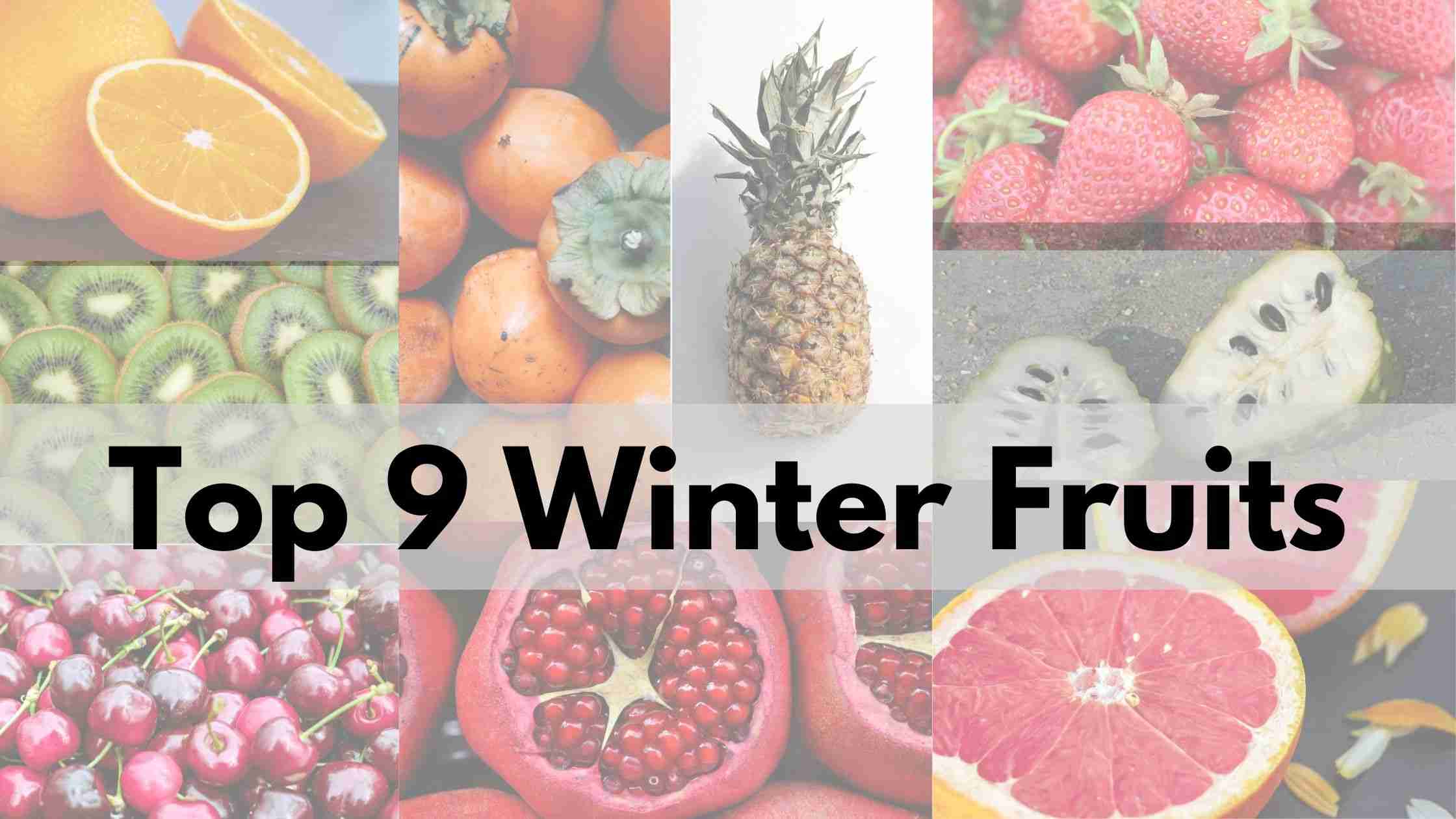Getting flu and cold symptoms as soon as the winter arises? Include these winter fruits in your diet and decrease your chances of catching those infections simultaneously with several other health benefits.
Winters are usually known for flu season and dry weather. As winter arises many people complain of flu-like symptoms, cough, allergies, and dryness on their skin. Some people also believe that winters are responsible for their bad health. Instead many diseases like asthma aggravated during the season.
With all the disadvantages of the winter season, there are also some of the benefits and unique flavors to enjoy including winter season exclusive fruits and vegetables. I will be discussing the top 9 exclusive winter fruits in this article and vegetables will be covered in the next one.
Grab this list of winter fruits, go to the grocery, and buy nutrients for yourself today. Take a look at the top 9 winter fruits that you should include in your diet. Consume at least 2 servings of any one or two of them daily basis.
This Article Contains
Top 9 Winter Fruits and Their Health Benefits
ORANGES
Oranges are one of the citrus winter fruits. They are low calorie, and highly nutritious. As part of a healthy and diverse diet, oranges offer strong immunity, clear skin, and can help lower the risk of catching many infections as well as help in preventing many diseases.
Oranges are popular in terms of Vitamin C content. However, oranges include a variety of other healthy compounds and antioxidants. They will not only reduce inflammation but also work against the disease.
Oranges help in immune-boosting, good for skin health, maintain blood pressure, blood sugar, and cholesterol, reduce cancer risk, decrease constipation, etc.
Nutritional Value of 1 Medium Orange as per FDA
Calories: 80
Carbohydrates: 19gm
Potassium: 250mg
Fiber: 3gm
Proteins: 1gm
Sugars: 14gm
Vitamin A: 2%
Vitamin C: 130%
Calcium: 6%
PERSIMMON
Persimmon is also known as Japanese fruit. It is one of the winter fruits which is tomato-shaped and color. Persimmon is not very popular and if you’ve not tried it before, you may be suspicious of how it will taste.
Trust me you must try it if you haven’t. It’s not only of good taste but also nutritionally packed. It has a mild sweetness and a sticky texture.
Persimmon helps in reducing inflammation, good for your heart, good for gut health, maintain eye health, and many more.
Nutritional Value of 1 Medium Persimmon
Calories: 115
Carbohydrates: 30gm
Potassium: 8%
Fiber: 3gm
Vitamin A: 55%
Vitamin E: 6%
Proteins: 1gm
Vitamin C: 22%
Vitamin K: 5%
Copper: 9%
Magnesium: 3%
GRAPEFRUIT
Grapefruit is also one of the winter fruits that just like oranges fall in the category of citrus fruits. Unlike oranges, it is a somewhat sweet and sour mix taste.
But like oranges, it’s rich in nutrients, and antioxidants making it one of the finest citrus fruits you can consume.
It can help you lose weight, prevent diabetes, good for your heart, decrease the risk of kidney stones, and many more.
Nutritional Value of 1/2 Medium Grapefruit as per FDA
Calories: 60
Carbohydrates: 15gm
Potassium: 160mg
Fiber: 2gm
Proteins: 1gm
Sugars: 11gm
Vitamin A: 35%
Vitamin C: 100%
Calcium: 4%
POMEGRANATE
The red jewel fruit is one of the healthiest fruit existed. It is called a heavenly fruit because it is the most discussed fruit in religious books. Pomegranate has anti-viral, as well as anti-tumor properties with that it is a good source of vitamins too.
It also contains two essential compounds punicalagin and punicic acid that have other several health benefits. Including pomegranates daily, is an excellent support for your immunity.
Pomegranate helps in boosting your immune system, reduce the -risk of certain cancers like prostate and breast, maintain your blood pressure, relife joint pain, prevent heart issues, improve memory, and many more.
Nutritional Value of 1 cup Pomegranate
Calories: 83
Carbohydrates: 18gm
Potassium: 236mg
Fiber: 4gm
Proteins: 1.5gm
Sugars: 14gm
Folate: 38mg
Vitamin C: 10mg
Vitamin K: 16mg
Magnesium: 12mg
PINEAPPLE
Pineapple is a tropical fruit, widely available, and mostly use nowadays in desserts and cakes. Available in raw and canned forms. But, you get its benefits only when you consumed them raw. Canned pineapples are having artificially added sugar that will have a bad impact on your health.
Pineapples help in preventing many diseases like asthma, age-related macular degeneration, cancer, blood pressure, diabetes. It also improves digestion and fertility, healing, heart health, and skin.
Nutritional Value of 2 Slices Upto 100gm of Pineapples per FDA
Calories: 50
Carbohydrates: 13gm
Sodium: 10mg
Potassium: 120mg
Fiber: 1gm
Proteins: 1gm
Sugars: 10gm
Vitamin A: 2%
Vitamin C: 50%
Calcium: 2%
Iron: 2%
STRAWBERRY
Strawberries are bright red, sweet, and juicy. They are plentiful in vitamins especially vitamin C and also contain decent quantities of potassium. Usually consumed raw, but strawberry shakes, jams, desserts are also very popular.
Strawberries are abundant in antioxidants, which may have several health benefits. Health benefits include maintaining good heart health and blood pressure, regulate blood sugar, prevent cancer and infections.
Nutritional Value of 8 Strawberries As Per FDA
Calories: 50
Carbohydrates: 11gm
Potassium: 170mg
Fiber: 2gm
Proteins: 1gm
Sugars: 8gm
Vitamin C: 160%
Calcium: 2%
Iron: 2%
KIWI
Kiwi is a fruit that is not only nutritionally dense but also carries a good flavor. The color is green which is soothing for the eyes and the flesh is tangy and sweet. This fruit is nutritionally dense containing good amounts of potassium, folate, vitamin C, vitamin E, and vitamin K.
Kiwi is antioxidants rich and has a healthy amount of fiber. It contains black seeds which are edible as well.
With the boost in the immune system kiwi also helps in maintaining good gut health, preventing asthma and some cancers like colon, etc.
Nutritional Value of 2 medium kiwis As Per FDA
Calories: 90
Carbohydrates: 20gm
Potassium: 450mg
Fiber: 4gm
Proteins: 1gm
Sugars: 13gm
Vitamin A: 2%
Vitamin C: 240%
Calcium: 4%
Iron: 2%
CHERRY
Cherry is a must on the winter fruits list. People love to have a cherry on cake and desserts but its benefits are more than that. They are delicious to eat and enjoy with the plus point of good nutritional abilities.
Health benefits of cherry include boosting immunity, and recovery from illness. Moreover cherry helps people with heart issues, arthritis, gout. Cherry also improves the quality of your beauty sleep and many more.
Nutritional Value of 154gm cherries
Calories: 97
Carbohydrates: 25gm
Potassium: 10%
Fiber: 3gm
Proteins: 2gm
Vitamin C: 18%
CUSTARD APPLE
Custard apple is called custard because of its sweet and creamy taste, it has a scaly round body with creamy texture inside. Also known as cherimoya.
It is fiber-rich, having vitamins, and minerals. Custard apple boost immunity, battle inflammation, and improve heart and eye health. However, certain elements of custard apple include toxins that may damage your brain, so always consume in moderation.
Health benefits include help maintaining eye health, blood pressure, heart health, gut health, can boost your mood, prevent cancer, and many more.
A Serving Of 100-gram Custard Apple Have
Calories: 94
Carbohydrates: 23gms
Proteins: 2gm
Fiber: 4gm
Vitamin C: 60%
Vitamin B6: 10%
In a nutshell above are listed some of the winter fruits, there is a huge list besides that too. Enjoy the benefits of every season with the taste it has to offer. Enjoy the weather, coffee, and fruits.






